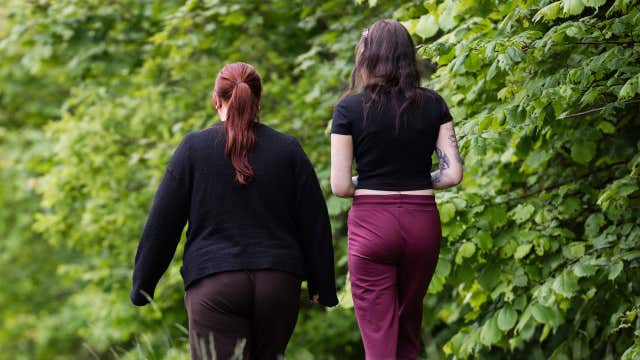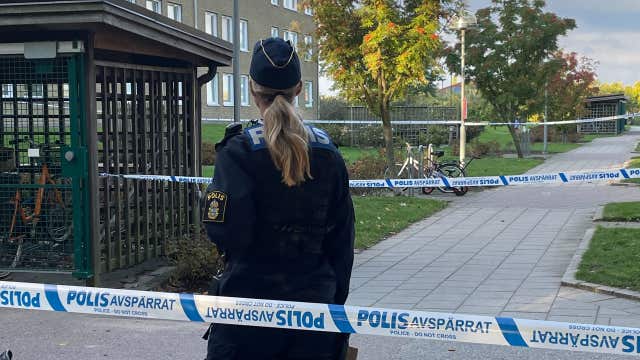Alva, 20, was reported for rape – now he lives next door
After a truly terrifying night, Alva and Ida reported two men for rape.
Now, two years later, the men have been acquitted.
And one of them has moved – to a home 300 meters from Alva.
“No matter how much you try to heal, you are constantly reminded,” she says.
At the same time, the friends feel mocked by the justice system. Latest news clips from Expressen.
On January 16, 2025, a bombshell falls on Alva and Ida. Then their lawyer calls and tells them: the men have been released from custody.
The world is falling apart.
And the next day, when the verdict comes and it is clear that the men are acquitted of rape, it rages a little more.
Alva describes her first feeling in a single word:
– Panic.
– While they were in custody, we were able to breathe a sigh of relief in a way. We could move around without worrying about them showing up. Then it was like being thrown back into reality, she says.
Friend Ida fills in:
– I broke down. It felt so good after the trial. It was really hard, but it still felt like we were listened to and believed.
Today the experience is different.
Domes
■ A 31-year-old man was charged with raping both Alva and Ida, as well as for taking offensive photographs. In January, the Jönköping District Court acquitted him of rape and assault in court, but sentenced him to pay a fine of 26,400 kronor and a total of 30,000 kronor in damages for taking offensive photographs when he filmed the two young women naked.
■ A 27-year-old man was charged with raping Alva. He was also acquitted.
■ The part of the verdict concerning the offensive photography has been appealed by the 31-year-old. There are no dates yet set for a hearing in the Court of Appeal.
It has now been five months since the verdict and the two women, both 20 years old, are receiving treatment at Alva’s home in a town in Jönköping County.
They sit down on the couch and start talking.
Low-key, thoughtful and expressive. They seek support in each other’s eyes, sometimes filling in each other’s sentences.
Alva and Ida say they want to tell the story because they feel like they haven’t been taken seriously. Because they feel like they’ve screamed as loud as they can without anyone listening.
Experienced a scary night
It was in March 2023 that the then 18-year-old friends met two men on their way to a party. They exchanged Snapchats, met up again later in the evening, and made their way to Ida’s apartment where they would continue drinking.
Then the stories differ.
The women have described a night of terror. They experienced that the men pushed them to drink and they have memory lapses. But they remember that, heavily intoxicated, they were raped repeatedly.
The men, however, a 27-year-old and a 31-year-old, have denied any wrongdoing and claimed that the sexual intercourse that took place was consensual.
District court acquits for rape
When the verdict came in January, the Jönköping District Court found that the men had “given several strange answers”, that the prosecutor’s evidence “in large respects” supported the prosecution, that Alva and Ida’s stories appeared credible, and that the young women’s reaction afterwards – including Alva hysterically calling her treatment therapist – speaks very strongly that they had been subjected to abuse.
“left several strange answers”“in large respects”“very strongly because they have been subjected to abuse”.
But the court also wrote that some of the evidence “suggests that the sexual intercourse was carried out without the consent of the plaintiffs” and also that the plaintiffs were in a particularly vulnerable situation due to intoxication.
“argues against the sexual intercourse having taken place without the consent of the plaintiffs”
The men were thus acquitted.
And the judgment has become final in the acquittal parts.
This is how the court reasons
■ Jönköping District Court writes that the plaintiffs’ stories appear credible and without exaggeration, but that they have gaps.
■ The court also writes that the men have “given several strange answers and done strange things during the evening”, but that it is not possible to prove that the sexual intercourse that took place was without consent.
■ In its reasoning, the district court points out, among other things, that one of the women initially heard her friend moaning, and that both women’s DNA was found on broken condom packages in the home.
“The findings with the plaintiffs’ DNA can be interpreted in such a way that they participated voluntarily in the sexual intercourse, although the opposite attitude is also possible,” the court writes.
“The findings with the plaintiffs’ DNA can be interpreted in such a way that they participated voluntarily in the sexual intercourse, although the opposite view is also possible”
In addition, the court writes that the women kissed the men before they ended up in the apartment, which “of course” does not mean consent to sexual acts later in the evening, but:
“However, it suggests to some extent that (the women) were positively disposed to meeting the defendants further during the evening and obviously to some physical contact.”
“However, it suggests to some extent that (the women) were positively disposed to meeting the defendants further during the evening and apparently to some physical contact.”
■ The court also does not believe that it has been proven that the women were heavily intoxicated, partly because one of them in a film from the night gives “very quick and clear answers”.
“very quick and clear answers”
The criticism: Didn’t get help
Alva and Ida say they wanted to appeal, but that they did not receive the help they expected.
They felt that the plaintiff’s attorney and the prosecutor were initially supportive, but turned against them after the verdict.
– We were called to a meeting with the plaintiff’s attorney where she said that she and the prosecutor neither wanted nor intended to appeal. We tried to ask why, but everything was very unclear, Alva says.
She and Ida have also reacted to several other things.
Among other things, films and audio recordings from the evening that the friends sent in, which they believe prove that they were heavily intoxicated, were not included in the preliminary investigation. And that the results from the blood and saliva samples they took at the hospital were not taken up in court.
Afterwards, they have not found the results, neither with the police nor in their medical records.
And they see the court’s reasoning regarding the condom packages (see fact box above) as “a mockery”.
(see fact box above)
– I felt such anger when I read that it could indicate consent, says Ida.
Expressen has been in contact with the prosecutor and the plaintiff’s attorney, who do not share the young women’s view (see fact box below). They state, briefly, that they have done what they should and that no mistakes have been made.
(see fact box below)
The prosecutor’s and defense attorney’s response to the criticism
Prosecutor Victor Backlund writes in an email that he took over the case from a colleague when it was time for the main hearing, and that he only spoke with the plaintiffs “very briefly.”
“The reason why I chose not to appeal the verdict is that I considered it unlikely that the Court of Appeal would reach a different conclusion than the district court did,” he writes.
“The reason why I chose not to appeal the verdict is that I considered it unlikely that the Court of Appeal would reach a different conclusion than the District Court did”
Since he took over the case, he has not worked to collect evidence. But his opinion is that the evidence that was available was presented “objectively and correctly” and that if there had been “other evidence of importance for the assessment, e.g. films or blood samples, I would have collected it”.
“objective and accurate”“if there had been other evidence of importance for the assessment, e.g. films or blood tests, I would have collected it”.
Claim counsel Elin Jaresund says she “worked hard” for Alva and Ida, and that she was also disappointed by the acquittal. When the prosecutor intended not to appeal, she had a personal meeting with the young women where they discussed the outcome, the prosecutor’s view and the conditions for an appeal.
“worked hard”
– I was very committed to the assignment and followed the plaintiffs’ instructions. The instruction at the time was not to appeal, says Elin Jaresund.
Neighbor – with the man she reported
Both young women have felt bad after the incident, and find it difficult to move on. Ida says that she is not allowed to begin her PTSD treatment until the part of the verdict regarding the offensive photography is decided in the Court of Appeal.
At the same time, one of the men has moved – and now lives only a couple to three hundred meters away from Alva.
When she discovered this last spring, she called Ida in a panic.
– I felt extremely unsafe. We’ve both struggled with feeling bad and flashbacks, but after the trial you could kind of start to process it a little. But when I found out he lived here, it all came back. I don’t want to go out alone anymore. I always have someone with me and I don’t dare go out without pepper spray in my jacket pocket.
Alva doesn’t know if it’s a coincidence that the man has moved there, but she says her address was on the papers he was given during the trial. Now she sees him from a distance every now and then – and is afraid of what might happen if they one day come face to face with each other.
– No matter what we do, we can’t seem to escape, or relax.
Alva finds it difficult to understand that the man has been able to settle so close to her. She says she can understand that, legally and objectively, as a free man, he has the right to live wherever he wants.
– But he knows, between us, what happened that night. And if it were me who was accused of something like that, I wouldn’t even want to live in the same city as that person.
Encourages to report
Despite everything that has happened, Alva and Ida are glad they reported it, and they advise other girls to do the same.
– Even though it’s hard. I think if more people stand up, maybe it will make a difference, says Ida.
Alva fills in:
– It is also important not to feel any shame over something that another person has done wrong.





